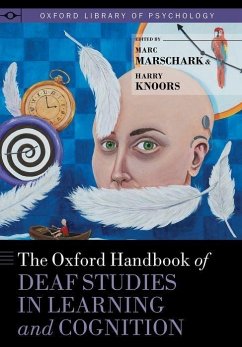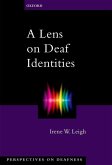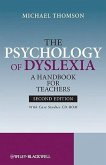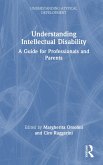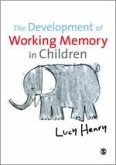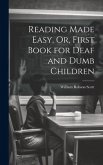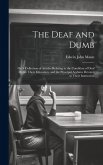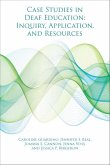Marschark
Ohb Deaf Stud in Learn & Cognit Olop C
Marschark
Ohb Deaf Stud in Learn & Cognit Olop C
- Gebundenes Buch
- Merkliste
- Auf die Merkliste
- Bewerten Bewerten
- Teilen
- Produkt teilen
- Produkterinnerung
- Produkterinnerung
The Oxford Handbook of Deaf Studies in Learning and Cognition focuses exclusively on learning, cognition, and cognitive development with regard to deaf individuals from theoretical, psychological, biological, linguistic, social-emotional, and educational perspectives. Each chapter includes state-of-the-art research conducted and reviewed by international experts in the area. Drawing this research together, this volume allows for a synergy of ideas that possesses the potential to move research, theory, and practice forward.
Andere Kunden interessierten sich auch für
![A Lens on Deaf Identities A Lens on Deaf Identities]() Irene W LeighA Lens on Deaf Identities103,99 €
Irene W LeighA Lens on Deaf Identities103,99 €![The Psychology of Dyslexia The Psychology of Dyslexia]() Michael ThomsonThe Psychology of Dyslexia128,99 €
Michael ThomsonThe Psychology of Dyslexia128,99 €![Understanding Intellectual Disability Understanding Intellectual Disability]() Understanding Intellectual Disability183,99 €
Understanding Intellectual Disability183,99 €![The Development of Working Memory in Children The Development of Working Memory in Children]() Lucy HenryThe Development of Working Memory in Children223,99 €
Lucy HenryThe Development of Working Memory in Children223,99 €![Reading Made Easy, Or, First Book for Deaf and Dumb Children Reading Made Easy, Or, First Book for Deaf and Dumb Children]() William Robson ScottReading Made Easy, Or, First Book for Deaf and Dumb Children33,99 €
William Robson ScottReading Made Easy, Or, First Book for Deaf and Dumb Children33,99 €![The Deaf and Dumb: Or, a Collection of Articles Relating to the Condition of Deaf Mutes; Their Education, and the Principal Asylums Devot The Deaf and Dumb: Or, a Collection of Articles Relating to the Condition of Deaf Mutes; Their Education, and the Principal Asylums Devot]() Edwin John MannThe Deaf and Dumb: Or, a Collection of Articles Relating to the Condition of Deaf Mutes; Their Education, and the Principal Asylums Devot39,99 €
Edwin John MannThe Deaf and Dumb: Or, a Collection of Articles Relating to the Condition of Deaf Mutes; Their Education, and the Principal Asylums Devot39,99 €![Case Studies in Deaf Education: Inquiry, Application, and Resources Case Studies in Deaf Education: Inquiry, Application, and Resources]() Caroline GuardinoCase Studies in Deaf Education: Inquiry, Application, and Resources87,99 €
Caroline GuardinoCase Studies in Deaf Education: Inquiry, Application, and Resources87,99 €-
-
-
The Oxford Handbook of Deaf Studies in Learning and Cognition focuses exclusively on learning, cognition, and cognitive development with regard to deaf individuals from theoretical, psychological, biological, linguistic, social-emotional, and educational perspectives. Each chapter includes state-of-the-art research conducted and reviewed by international experts in the area. Drawing this research together, this volume allows for a synergy of ideas that possesses the potential to move research, theory, and practice forward.
Hinweis: Dieser Artikel kann nur an eine deutsche Lieferadresse ausgeliefert werden.
Hinweis: Dieser Artikel kann nur an eine deutsche Lieferadresse ausgeliefert werden.
Produktdetails
- Produktdetails
- Verlag: Hurst & Co.
- Seitenzahl: 480
- Erscheinungstermin: 25. Mai 2020
- Englisch
- Abmessung: 257mm x 183mm x 30mm
- Gewicht: 980g
- ISBN-13: 9780190054045
- ISBN-10: 0190054042
- Artikelnr.: 58568025
- Herstellerkennzeichnung
- Libri GmbH
- Europaallee 1
- 36244 Bad Hersfeld
- 06621 890
- Verlag: Hurst & Co.
- Seitenzahl: 480
- Erscheinungstermin: 25. Mai 2020
- Englisch
- Abmessung: 257mm x 183mm x 30mm
- Gewicht: 980g
- ISBN-13: 9780190054045
- ISBN-10: 0190054042
- Artikelnr.: 58568025
- Herstellerkennzeichnung
- Libri GmbH
- Europaallee 1
- 36244 Bad Hersfeld
- 06621 890
Marc Marschark is Professor at the National Technical Institute for the Deaf, a college of Rochester Institute of Technology, where he directs the Center for Education Research Partnerships. His primary interest is in relations among language, learning, and cognition; current research focuses on such relations among deaf children and adults in formal and informal educational settings. Harry Knoors is Professor at the Behavioural Science Institute of the Radboud University Nijmegen, the Netherlands, and Academic Director at Royal Dutch Kentalis. Knoors is trained as a psycholinguist, specializing in language and literacy of deaf children. He is involved in research on childhood deafness (mainly language, literacy, and psychosocial development) and research on the effectiveness of special education.
* Contents
* Preface
* Deaf Studies in Learning and Cognition: A Coming-of-Age Story
* Marc Marschark and Harry Knoors
* Part One: Language, Learning, and Cognition
* 1. Foundations of Language Development in Deaf and Hard-of-hearing
Infants: Cognitive and Social Processes
* Dani Levine, Daniela Avelar, Roberta Michnick Golinkoff, Derek
Houston, and Kathy Hirsh-Pasek
* 2. Developmental, Cognitive, and Neurocognitive Perspectives on
Language Development in Children Who Use Cochlear Implants
* Pasquale Rinaldi, Francesco Pavani, and Maria Cristina Caselli
* 3. Investigating Early Preimplant Predictors of Language and
Cognitive Development in Children With Cochlear Implants
* Mary K. Fagan, Laurie S. Eisenberg, and Karen C. Johnson
* 4. The Effect of Communication Mode on Learning Outcomes for Children
With Severe-Profound Hearing Loss
* Julia Sarant and Ann Geers
* Part Two: Cognition and Language: Foundations and Outcomes
* 5. It Is More Than Language: The Role of Cognition in the Pragmatic
Skills of Children Who Are Deaf or Hard-of-hearing
* Dianne Toe, Louise Paatsch, and Amy Szarkowski
* 6. Dissociating the Impact of Auditory Access and Language Access in
Deaf Children's Cognitive Development
* Matthew Hall
* 7. How Early Auditory Experience Affects Children's Ability to Learn
Spoken Words
* Derek Houston, Chi-Hsin Chen, Claire Monroy, and Irina Castellanos
* 8. Triggering, Configuration, and Engagement: Spoken Word Learning
Processes in Young Children With Hearing Loss
* Emily Lund
* 9. Bilingual Cognitive Advantages in Multilingual and Multimodal Deaf
and Hard-of-hearing Children and Adults
* Kathryn Crowe and Linda Cupples
* 10. I Should Do as I Say, Not as I Do: Self-regulation and
Psychosocial Outcomes in Deaf Children With Cochlear Implants
* Irina Castellanos, David B. Pisoni, and William G. Kronenberger
* Part Three: Learning and Cognition in Development
* 11. Verbal Learning and Memory Processes After Cochlear Implantation
* David B. Pisoni, William G. Kronenberger, Michael S. Harris, and
Aaron C. Moberly
* 12. Cognitive Development: The Impact of Pediatric Cochlear
Implantation
* Lindsey Edwards and Peter Isquith
* 13. Theory of Mind and Conversation in Deaf and Hearing Children
* Candida C. Peterson
* 14. Theory of Mind: Implications for Cognition and Learning in Deaf
and Hard-of-hearing Learners
* Stacey Tucci and Susan Easterbrooks
* 15. Why Are Children With Cochlear Implants at Risk for Executive
Functioning Delays: Language Only or Something More?
* William G. Kronenberger and David B. Pisoni
* 16. Executive Functions and Access to Language: The Importance of
Intersubjectivity
* Gary Morgan and Matt Dye
* 17. Working Memory for Signs and Gestures
* Mary Rudner and Jerker Rönnberg
* Part Four: Cognition and Literacy
* 18. Executive Function, Memory, and Literacy in Deaf Learners:
Reading and Writing Involve More Than Just Words and Grammar
* Donna Morere
* 19. The Influence of Explicit and Implicit Memory Processes on the
Spoken-Written Language Learning of Children With Cochlear Implants
* Barbara Arfé and Ambra Fastelli
* 20. Changing Perspectives for the 21st Century: Digital Literacy and
Computational Thinking for Deaf/Hard-of-hearing Learners
* Karen L. Kritzer and Chad Smith
* 21. The Neurobiology of Reading Differs for Deaf and Hearing Adults
* Karen Emmorey
* Part Five: Learning and Cognition in the Real World
* 22. Framing Educational Needs of Deaf and Hard-of-Hearing Infants and
Toddlers Using the Developmental Systems Approach
* Manfred Hintermair
* 23. Making "Normal" Count: Mediating for Early Mathematics Learning
in Young Deaf and Hard-of-hearing Children
* Karen L. Kritzer
* 24. Tickets for the Inclusive Museum: Accessible Opportunities for
Nonformal Learning by Deaf and Hard-of-hearing Individuals
* Magda Nikolaraizi, Charikleia Kanari, and Marc Marschark
* 25. Technology Makes Things Possible: Improving the Abilities of Deaf
and Hard-of-hearing Children with Advanced Technologies
* Sigal Eden
* 26. Accommodating Deaf and Hard of Hearing Children With Cognitive
Deficits
* Harry Knoors and Marc Marschark
* Index
* Preface
* Deaf Studies in Learning and Cognition: A Coming-of-Age Story
* Marc Marschark and Harry Knoors
* Part One: Language, Learning, and Cognition
* 1. Foundations of Language Development in Deaf and Hard-of-hearing
Infants: Cognitive and Social Processes
* Dani Levine, Daniela Avelar, Roberta Michnick Golinkoff, Derek
Houston, and Kathy Hirsh-Pasek
* 2. Developmental, Cognitive, and Neurocognitive Perspectives on
Language Development in Children Who Use Cochlear Implants
* Pasquale Rinaldi, Francesco Pavani, and Maria Cristina Caselli
* 3. Investigating Early Preimplant Predictors of Language and
Cognitive Development in Children With Cochlear Implants
* Mary K. Fagan, Laurie S. Eisenberg, and Karen C. Johnson
* 4. The Effect of Communication Mode on Learning Outcomes for Children
With Severe-Profound Hearing Loss
* Julia Sarant and Ann Geers
* Part Two: Cognition and Language: Foundations and Outcomes
* 5. It Is More Than Language: The Role of Cognition in the Pragmatic
Skills of Children Who Are Deaf or Hard-of-hearing
* Dianne Toe, Louise Paatsch, and Amy Szarkowski
* 6. Dissociating the Impact of Auditory Access and Language Access in
Deaf Children's Cognitive Development
* Matthew Hall
* 7. How Early Auditory Experience Affects Children's Ability to Learn
Spoken Words
* Derek Houston, Chi-Hsin Chen, Claire Monroy, and Irina Castellanos
* 8. Triggering, Configuration, and Engagement: Spoken Word Learning
Processes in Young Children With Hearing Loss
* Emily Lund
* 9. Bilingual Cognitive Advantages in Multilingual and Multimodal Deaf
and Hard-of-hearing Children and Adults
* Kathryn Crowe and Linda Cupples
* 10. I Should Do as I Say, Not as I Do: Self-regulation and
Psychosocial Outcomes in Deaf Children With Cochlear Implants
* Irina Castellanos, David B. Pisoni, and William G. Kronenberger
* Part Three: Learning and Cognition in Development
* 11. Verbal Learning and Memory Processes After Cochlear Implantation
* David B. Pisoni, William G. Kronenberger, Michael S. Harris, and
Aaron C. Moberly
* 12. Cognitive Development: The Impact of Pediatric Cochlear
Implantation
* Lindsey Edwards and Peter Isquith
* 13. Theory of Mind and Conversation in Deaf and Hearing Children
* Candida C. Peterson
* 14. Theory of Mind: Implications for Cognition and Learning in Deaf
and Hard-of-hearing Learners
* Stacey Tucci and Susan Easterbrooks
* 15. Why Are Children With Cochlear Implants at Risk for Executive
Functioning Delays: Language Only or Something More?
* William G. Kronenberger and David B. Pisoni
* 16. Executive Functions and Access to Language: The Importance of
Intersubjectivity
* Gary Morgan and Matt Dye
* 17. Working Memory for Signs and Gestures
* Mary Rudner and Jerker Rönnberg
* Part Four: Cognition and Literacy
* 18. Executive Function, Memory, and Literacy in Deaf Learners:
Reading and Writing Involve More Than Just Words and Grammar
* Donna Morere
* 19. The Influence of Explicit and Implicit Memory Processes on the
Spoken-Written Language Learning of Children With Cochlear Implants
* Barbara Arfé and Ambra Fastelli
* 20. Changing Perspectives for the 21st Century: Digital Literacy and
Computational Thinking for Deaf/Hard-of-hearing Learners
* Karen L. Kritzer and Chad Smith
* 21. The Neurobiology of Reading Differs for Deaf and Hearing Adults
* Karen Emmorey
* Part Five: Learning and Cognition in the Real World
* 22. Framing Educational Needs of Deaf and Hard-of-Hearing Infants and
Toddlers Using the Developmental Systems Approach
* Manfred Hintermair
* 23. Making "Normal" Count: Mediating for Early Mathematics Learning
in Young Deaf and Hard-of-hearing Children
* Karen L. Kritzer
* 24. Tickets for the Inclusive Museum: Accessible Opportunities for
Nonformal Learning by Deaf and Hard-of-hearing Individuals
* Magda Nikolaraizi, Charikleia Kanari, and Marc Marschark
* 25. Technology Makes Things Possible: Improving the Abilities of Deaf
and Hard-of-hearing Children with Advanced Technologies
* Sigal Eden
* 26. Accommodating Deaf and Hard of Hearing Children With Cognitive
Deficits
* Harry Knoors and Marc Marschark
* Index
* Contents
* Preface
* Deaf Studies in Learning and Cognition: A Coming-of-Age Story
* Marc Marschark and Harry Knoors
* Part One: Language, Learning, and Cognition
* 1. Foundations of Language Development in Deaf and Hard-of-hearing
Infants: Cognitive and Social Processes
* Dani Levine, Daniela Avelar, Roberta Michnick Golinkoff, Derek
Houston, and Kathy Hirsh-Pasek
* 2. Developmental, Cognitive, and Neurocognitive Perspectives on
Language Development in Children Who Use Cochlear Implants
* Pasquale Rinaldi, Francesco Pavani, and Maria Cristina Caselli
* 3. Investigating Early Preimplant Predictors of Language and
Cognitive Development in Children With Cochlear Implants
* Mary K. Fagan, Laurie S. Eisenberg, and Karen C. Johnson
* 4. The Effect of Communication Mode on Learning Outcomes for Children
With Severe-Profound Hearing Loss
* Julia Sarant and Ann Geers
* Part Two: Cognition and Language: Foundations and Outcomes
* 5. It Is More Than Language: The Role of Cognition in the Pragmatic
Skills of Children Who Are Deaf or Hard-of-hearing
* Dianne Toe, Louise Paatsch, and Amy Szarkowski
* 6. Dissociating the Impact of Auditory Access and Language Access in
Deaf Children's Cognitive Development
* Matthew Hall
* 7. How Early Auditory Experience Affects Children's Ability to Learn
Spoken Words
* Derek Houston, Chi-Hsin Chen, Claire Monroy, and Irina Castellanos
* 8. Triggering, Configuration, and Engagement: Spoken Word Learning
Processes in Young Children With Hearing Loss
* Emily Lund
* 9. Bilingual Cognitive Advantages in Multilingual and Multimodal Deaf
and Hard-of-hearing Children and Adults
* Kathryn Crowe and Linda Cupples
* 10. I Should Do as I Say, Not as I Do: Self-regulation and
Psychosocial Outcomes in Deaf Children With Cochlear Implants
* Irina Castellanos, David B. Pisoni, and William G. Kronenberger
* Part Three: Learning and Cognition in Development
* 11. Verbal Learning and Memory Processes After Cochlear Implantation
* David B. Pisoni, William G. Kronenberger, Michael S. Harris, and
Aaron C. Moberly
* 12. Cognitive Development: The Impact of Pediatric Cochlear
Implantation
* Lindsey Edwards and Peter Isquith
* 13. Theory of Mind and Conversation in Deaf and Hearing Children
* Candida C. Peterson
* 14. Theory of Mind: Implications for Cognition and Learning in Deaf
and Hard-of-hearing Learners
* Stacey Tucci and Susan Easterbrooks
* 15. Why Are Children With Cochlear Implants at Risk for Executive
Functioning Delays: Language Only or Something More?
* William G. Kronenberger and David B. Pisoni
* 16. Executive Functions and Access to Language: The Importance of
Intersubjectivity
* Gary Morgan and Matt Dye
* 17. Working Memory for Signs and Gestures
* Mary Rudner and Jerker Rönnberg
* Part Four: Cognition and Literacy
* 18. Executive Function, Memory, and Literacy in Deaf Learners:
Reading and Writing Involve More Than Just Words and Grammar
* Donna Morere
* 19. The Influence of Explicit and Implicit Memory Processes on the
Spoken-Written Language Learning of Children With Cochlear Implants
* Barbara Arfé and Ambra Fastelli
* 20. Changing Perspectives for the 21st Century: Digital Literacy and
Computational Thinking for Deaf/Hard-of-hearing Learners
* Karen L. Kritzer and Chad Smith
* 21. The Neurobiology of Reading Differs for Deaf and Hearing Adults
* Karen Emmorey
* Part Five: Learning and Cognition in the Real World
* 22. Framing Educational Needs of Deaf and Hard-of-Hearing Infants and
Toddlers Using the Developmental Systems Approach
* Manfred Hintermair
* 23. Making "Normal" Count: Mediating for Early Mathematics Learning
in Young Deaf and Hard-of-hearing Children
* Karen L. Kritzer
* 24. Tickets for the Inclusive Museum: Accessible Opportunities for
Nonformal Learning by Deaf and Hard-of-hearing Individuals
* Magda Nikolaraizi, Charikleia Kanari, and Marc Marschark
* 25. Technology Makes Things Possible: Improving the Abilities of Deaf
and Hard-of-hearing Children with Advanced Technologies
* Sigal Eden
* 26. Accommodating Deaf and Hard of Hearing Children With Cognitive
Deficits
* Harry Knoors and Marc Marschark
* Index
* Preface
* Deaf Studies in Learning and Cognition: A Coming-of-Age Story
* Marc Marschark and Harry Knoors
* Part One: Language, Learning, and Cognition
* 1. Foundations of Language Development in Deaf and Hard-of-hearing
Infants: Cognitive and Social Processes
* Dani Levine, Daniela Avelar, Roberta Michnick Golinkoff, Derek
Houston, and Kathy Hirsh-Pasek
* 2. Developmental, Cognitive, and Neurocognitive Perspectives on
Language Development in Children Who Use Cochlear Implants
* Pasquale Rinaldi, Francesco Pavani, and Maria Cristina Caselli
* 3. Investigating Early Preimplant Predictors of Language and
Cognitive Development in Children With Cochlear Implants
* Mary K. Fagan, Laurie S. Eisenberg, and Karen C. Johnson
* 4. The Effect of Communication Mode on Learning Outcomes for Children
With Severe-Profound Hearing Loss
* Julia Sarant and Ann Geers
* Part Two: Cognition and Language: Foundations and Outcomes
* 5. It Is More Than Language: The Role of Cognition in the Pragmatic
Skills of Children Who Are Deaf or Hard-of-hearing
* Dianne Toe, Louise Paatsch, and Amy Szarkowski
* 6. Dissociating the Impact of Auditory Access and Language Access in
Deaf Children's Cognitive Development
* Matthew Hall
* 7. How Early Auditory Experience Affects Children's Ability to Learn
Spoken Words
* Derek Houston, Chi-Hsin Chen, Claire Monroy, and Irina Castellanos
* 8. Triggering, Configuration, and Engagement: Spoken Word Learning
Processes in Young Children With Hearing Loss
* Emily Lund
* 9. Bilingual Cognitive Advantages in Multilingual and Multimodal Deaf
and Hard-of-hearing Children and Adults
* Kathryn Crowe and Linda Cupples
* 10. I Should Do as I Say, Not as I Do: Self-regulation and
Psychosocial Outcomes in Deaf Children With Cochlear Implants
* Irina Castellanos, David B. Pisoni, and William G. Kronenberger
* Part Three: Learning and Cognition in Development
* 11. Verbal Learning and Memory Processes After Cochlear Implantation
* David B. Pisoni, William G. Kronenberger, Michael S. Harris, and
Aaron C. Moberly
* 12. Cognitive Development: The Impact of Pediatric Cochlear
Implantation
* Lindsey Edwards and Peter Isquith
* 13. Theory of Mind and Conversation in Deaf and Hearing Children
* Candida C. Peterson
* 14. Theory of Mind: Implications for Cognition and Learning in Deaf
and Hard-of-hearing Learners
* Stacey Tucci and Susan Easterbrooks
* 15. Why Are Children With Cochlear Implants at Risk for Executive
Functioning Delays: Language Only or Something More?
* William G. Kronenberger and David B. Pisoni
* 16. Executive Functions and Access to Language: The Importance of
Intersubjectivity
* Gary Morgan and Matt Dye
* 17. Working Memory for Signs and Gestures
* Mary Rudner and Jerker Rönnberg
* Part Four: Cognition and Literacy
* 18. Executive Function, Memory, and Literacy in Deaf Learners:
Reading and Writing Involve More Than Just Words and Grammar
* Donna Morere
* 19. The Influence of Explicit and Implicit Memory Processes on the
Spoken-Written Language Learning of Children With Cochlear Implants
* Barbara Arfé and Ambra Fastelli
* 20. Changing Perspectives for the 21st Century: Digital Literacy and
Computational Thinking for Deaf/Hard-of-hearing Learners
* Karen L. Kritzer and Chad Smith
* 21. The Neurobiology of Reading Differs for Deaf and Hearing Adults
* Karen Emmorey
* Part Five: Learning and Cognition in the Real World
* 22. Framing Educational Needs of Deaf and Hard-of-Hearing Infants and
Toddlers Using the Developmental Systems Approach
* Manfred Hintermair
* 23. Making "Normal" Count: Mediating for Early Mathematics Learning
in Young Deaf and Hard-of-hearing Children
* Karen L. Kritzer
* 24. Tickets for the Inclusive Museum: Accessible Opportunities for
Nonformal Learning by Deaf and Hard-of-hearing Individuals
* Magda Nikolaraizi, Charikleia Kanari, and Marc Marschark
* 25. Technology Makes Things Possible: Improving the Abilities of Deaf
and Hard-of-hearing Children with Advanced Technologies
* Sigal Eden
* 26. Accommodating Deaf and Hard of Hearing Children With Cognitive
Deficits
* Harry Knoors and Marc Marschark
* Index

